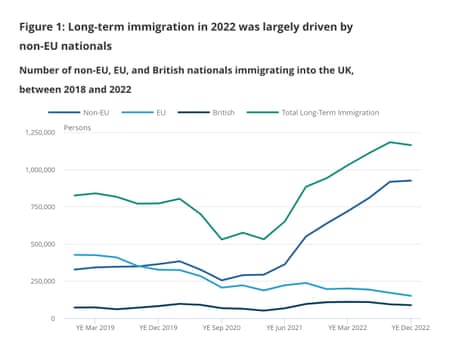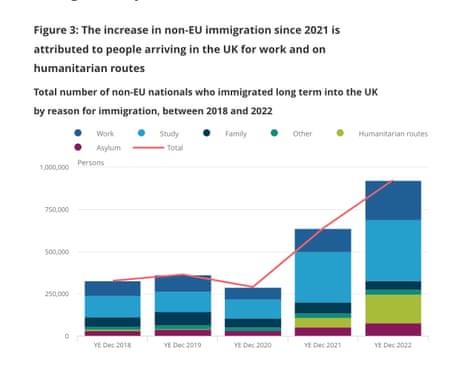Rishi Sunak says immigration numbers ‘too high’ but says system not ‘out of control’ – UK politics live | Politics
Sunak says immigration numbers ‘too high’ – but rejects claim system ‘out of control’
Rishi Sunak is being interviewed on ITV’s This Morning.
He says immigration levels are too high, but he rejects claims it is out of control. This is from the Daily Mirror’s Lizzy Buchan.
Rishi Sunak tells @thismorning on net migration: “The numbers are too high, it’s as simple as that. And I want to bring them down.”
But he denies figures are “out of control”
— Lizzy Buchan (@LizzyBuchan) May 25, 2023
Q: What is your target for bringing immigration down?
Sunak says he wants to bring immigration down. But he inherited a net immigration figure of around 500,000, he says.
Q: When will we see the first people being sent to Rwanda?
Sunak says he thinks people are supportive of the plan. It is not fair if people come here illegally, he claims. That is not fair on taxpayers, and not fair on the people who need help. The government wants to welcome vulnerable people; but it cannot if people are coming to the UK illegally, he says.
Key events
Labour says immigration figures show government has ‘no plan and no grip’
We are about to get an urgent question on the immigration figures from Yvette Cooper, the shadow home secretary. She has just released this statement, which will probably give a flavour of what she will say to MPs.
These extraordinary figures, including doubling the number of work visas since the pandemic, show the Conservatives have no plan and no grip on immigration. Ministers have completely failed to tackle skills shortages, especially in health and social care, or to get people back into work after Covid.
Net migration should come down and we expect it to do so. Support we have rightly given to Ukrainians and Hong Kongers has unusually affected the figures this year. But that can’t disguise the fact that the Conservatives’ chaotic approach means that work visas are up 119 per cent, net migration is more than twice the level ministers were aiming for, and the asylum backlog is at a record high despite Rishi Sunak promising to clear it this year.
Labour will put skills and fairness at the heart of the immigration system – tackling skills shortages and ending the unfair wage discount so employers recruiting from overseas have to pay the going rate. Immigration makes an important contribution to Britain so it needs to be properly managed and controlled so the system is fair.
Sunak tells ITV’s This Morning that being PM is hard – but that he likes Jilly Cooper novels because ‘you need escapism’
Q: People want to know about you a little. How do your daughters deal with reading about you in the papers?
Sunak says his children are 10 and 12, and don’t really follow the news. That is good, he says. He says he has been in politics for the last few years, so they are used to that. But fundamentally he is dad. They are more interested in things like playing Top Trumps.
Q: Is it really true you like Jilly Cooper books?
Yes, says Sunak, Riders, Rivals, Polo – he likes them, he says.
Q: When did you last cry?
He says it was something to do with one of their children, a while back.
Q: What is your biggest regret?
Sunak takes a while to think.
He jokes about revealling that he likes Jilly Cooper books.
But they are good, he says. “You need to have escapism in your life”, he says.
Q: How does the reality of being PM compare with the expectations?
Sunak says he did not expect to get the job. But he though he could make a difference.
The job is hard, he says. He lists the issues he is facing. But he thinks he can make a difference.
Getting illegal immigration down will be hard. But he thinks he can deal with it, he says.
Q: You are launching a new NHS app. What will it do? Bring waiting lists down?
Yes, says Sunak. He says he will give patients choice about where they get their treatment from.
(The Department of Health and Social Care has more details of this announcement here.)
He says people will be able to use the NHS app that people used during Covid to find the hospitals where they can get treated most quickly.
Later this year this will be extended to people already on waiting lists, he says.
He says he has “practically” eliminated the number of people waiting a year and a half for an operation. He says he wanted to stop waits that long by this spring. That is “just about done”, he says.
(Technically, though, he missed his target.)
Sunak says he dealt with Suella Braverman case ‘professionally’
Sunak is now being asked about Suella Braverman.
Alison Hammond, the presenter, says it would have been good if Suella Braverman had done a group speed awareness course. That would have shown that the law applies to politicians, she says. She says she has done two – and people were taking selfies of her during them.
Sunak stresses that, in the end, Braverman did not do a private speed awareness course.
He defends how he handled the issue. He got the facts, and made a decison. He was dealing with it “professionally”, he says.
Sunak says immigration numbers ‘too high’ – but rejects claim system ‘out of control’
Rishi Sunak is being interviewed on ITV’s This Morning.
He says immigration levels are too high, but he rejects claims it is out of control. This is from the Daily Mirror’s Lizzy Buchan.
Rishi Sunak tells @thismorning on net migration: “The numbers are too high, it’s as simple as that. And I want to bring them down.”
But he denies figures are “out of control”
— Lizzy Buchan (@LizzyBuchan) May 25, 2023
Q: What is your target for bringing immigration down?
Sunak says he wants to bring immigration down. But he inherited a net immigration figure of around 500,000, he says.
Q: When will we see the first people being sent to Rwanda?
Sunak says he thinks people are supportive of the plan. It is not fair if people come here illegally, he claims. That is not fair on taxpayers, and not fair on the people who need help. The government wants to welcome vulnerable people; but it cannot if people are coming to the UK illegally, he says.
The Home Office has also published data on asylum seekers this morning. Mark Easton, the BBC’s home affairs editor, says the figures show the backlog for unprocessed asylum claims is still going up – even though Rishi Sunak has committed to bring it down.
BREAKING: Despite Rishi Sunak’s promise to eradicate much of the asylum backlog this year, the number waiting for an initial decision is UP to 172,758 from 166,261. The number waiting more than six months has increased by ~10,000 to 128,812. @ukhomeoffice
— Mark Easton (@BBCMarkEaston) May 25, 2023
He also says the figures show levels for deportations at a record low, outside the pandemic years.
The number of foreign criminals and failed asylum seekers removed in 2022 was 38,000, the LOWEST number on record apart from the pandemic years (2020-21). @ukhomeoffice
— Mark Easton (@BBCMarkEaston) May 25, 2023
At 10.30am there will be an urgent question in the Commons on the immigration figures. Yvette Cooper, the shadow home secretary, has tabled the question. A Home Office minister will respond.
After that there are two Commons statements from Steve Barclay, the health secretary, on patient choice and then on new hospitals, and then Mark Spencer, the farming minister, will make a statement on animal welfare.
Here is my colleague Rajeev Syal’s story on today’s immigration figures.
At 606,000, the net migration figure for 2022 reported by the ONS this morning is still a record figure – even though it is well below some of the predictions. Net migration in the 12 months to June 2022 was 504,000.
Commenting on the figures, Jay Lindop, director of the Centre for International Migration at the ONS:
The main drivers of the increase were people coming to the UK from non-EU countries for work, study and for humanitarian purposes, including those arriving from Ukraine and Hong Kong. For the first time since using our new methods to measure migration, we have also included asylum seekers in our estimates, with around 1 in 12 non-EU migrants coming via this route.
There are some signs that the underlying drivers behind these high levels of migration are changing. As lockdown restrictions were lifted in 2021, we saw a sharp increase in students arriving.
Recent data suggests that those arriving in 2021 are now leaving the country, with the overall share of non-EU immigration for students falling in 2022.
In contrast, those arriving on humanitarian routes increased over the 12 months. Evidence also suggests immigration has slowed in recent months, potentially demonstrating the temporary nature of these events.
Here are two charts from the ONS report that give more details of the immigration figures.
This chart shows that arrivals from non-EU countries are driving the rise in immigration. (It just shows immigration figures – the headline figure is the net figure, the total number of immigrants minus the total number of people who emigrated).

And this chart shows why people are coming to the UK. Study is the biggest single reason for people getting a visa.

Net migration for 2022 was 606,000, ONS says – less than forecast, but still 118,000 higher than in 2021
The ONS migration figures are out. They’re here.
Net migration last year was 606,000, the figures show.
That is well below expectations – 700,000 or more was the consensus view, with some reports saying it could be close to 1m – but this is still roughly three times as high as the figure the Tories were promising in their 2019 manifesto.
This is from the ONS news release.
Total long-term immigration was estimated at around 1.2 million in 2022, and emigration was 557,000, which means migration continues to add to the population with net migration at 606,000; most people arriving to the UK in 2022 were non-EU nationals (925,000), followed by EU (151,000) and British (88,000).
People coming to the UK from non-EU countries for work, study, and for humanitarian purposes, including unique events such as those arriving from Ukraine and Hong Kong, have contributed towards relatively high levels of immigration over the past 18 months; however, growth has slowed over recent quarters, potentially demonstrating the temporary nature of these impacts.
The composition of non-EU immigration changed in 2022, with 39% of people arriving for study related reasons, down from 47% in 2021; those arriving on humanitarian routes (including Ukrainian schemes) increased from 9% to 19% over the same period.
Evidence suggests that students typically stay for shorter periods than other migrants and that the majority leave at the end of their study; the latest data shows that those who arrived for study reasons in 2021 are now starting to leave, driving an increase in total emigration from 454,000 in 2021 to 557,000 in 2022.
Both a slowing of immigration and rising of emigration means that levels of net migration have levelled off in recent quarters; an estimated 606,000 more people arrived long-term to the UK than departed in YE December 2022, 118,000 higher than a year previously, but similar to levels in YE June 2022.
The improvement in methods means the previously published immigration estimate for YE June 2022 is revised upwards by 45,000 to 1,109,000, emigration downwards by negative 57,000 to 503,000, and net migration revised by 102,000 to 606,000.
In his Today programme interview Sir John Hayes, the Tory former minister who chairs the Common Sense group for rightwing government backbenchers, was asked what was wrong with high immigration, given that people were coming to the UK to do jobs that weren’t being done by British workers. He replied:
Well, it is certainly that the ease of paying workers from abroad displaces investment in domestic skills, including upskilling the existing workforce. But it also displaces investment in the modernisation of economy, and in better working practices. And the consequence is bound to inhibit productivity and damage competitiveness.
So you’re right that we should be training people, giving opportunities … and immigration doesn’t help with that. It displaces that kind of concentration.
But there’s a bigger point. You can have an economy that’s based on labour intensity, a very labour intensive economy, which is low skilled, and hope that somehow boosts growth as a whole.
But actually, what we want is a high tech, high skills economy. We want, wherever we can, to move to automation, towards modernisation, to have a more streamlined economy, because that’s the future. We’re not going to compete with China and other countries, India which have a high level of labour dependence.
This is similar to the analysis published by the Labour party yesterday, as it announced new plans intended to limit the number of work visas issued.
But when it was put to Hayes that there just were not enough Britons available to do these jobs, he suggested that people currently on sick leave, and disabled people, could fill many of the gaps. He said:
We’ve got 2.5 million people on long-term sick leave. We’ve got very many disabled people who said they want to work and can’t get jobs. We’ve got a lot of people who left the workforce during Covid, older people typically, who we need to get back into the workforce. So the argument there are no Britons for these jobs does not really stand up to the test of those figures.
Stephen Kinnock, Labour’s immigration spokesperson, told LBC this morning that the figures today would show the government had lost control of immigration. He said:
[The figures] will say that they’ve lost control of the issue. They have failed to have a strategy in place for our local labour market, and as a result of that, employers are being forced to reach for overseas immigration.
We need a much more balanced approach, ensuring that we have the immigration we need, of course, but that there’s much more opportunity for skills, productivity training, workforce planning to get our economy firing on all cylinders again.
Good morning. The Office for National Statistics will publish net migration figures for 2022 within the hour, and they are expected to show a record number of people arriving – around 700,000 or more, according to estimates. Because the Conservatives have been promising to reduce immigration levels since 2010, because people at the top of government championed Brexit, which was supposed to make it easier for the UK to control immigration numbers, and because the 2019 Tory manifesto implied annual net migration would below 226,000 by the time of the next election, these numbers will be a big problem for Rishi Sunak.
On the Today programme this morning Sir John Hayes, who chairs the Common Sense group of rightwing Tory MPs and who is an ally of Suella Braverman, the home secretary, said an increase along the lines expected would not be acceptable. He said:
You can’t grow your population at 700,000 a year – where on earth are you going to house these people? We build about 180,000 new homes a year.
Of course more than a million have come because this is a net figure, if it does turn out to be 700,000.
You just can’t grow the population at that pace. The pressure it places on public services and housing … The whole government needs to work together to deal with unprecedented population growth, which just is not sustainable.
I will post more from his interview shortly.
Here is the agenda for the day.
9.30am: The ONS publishes net migration figures for 2022. At the same time, the Home Office is also publishing figures about asylum application and small boat Channel crossings.
10am: Rishi Sunak gives an interview to ITV’s This Morning.
11.30am: Downing Street holds a lobby briefing.
12pm: Humza Yousaf takes first minister’s questions at Holyrood.
If you want to contact me, do try the “send us a message” feature. You’ll see it just below the byline – on the left of the screen, if you are reading on a PC or a laptop. This is for people who want to message me directly. I find it very useful when people message to point out errors (even typos – no mistake is too small to correct). Often I find your questions very interesting too. I can’t promise to reply to them all, but I will try to reply to as many as I can, either in the comments below the line, privately (if you leave an email address and that seems more appropriate), or in the main blog, if I think it is a topic of wide interest.




